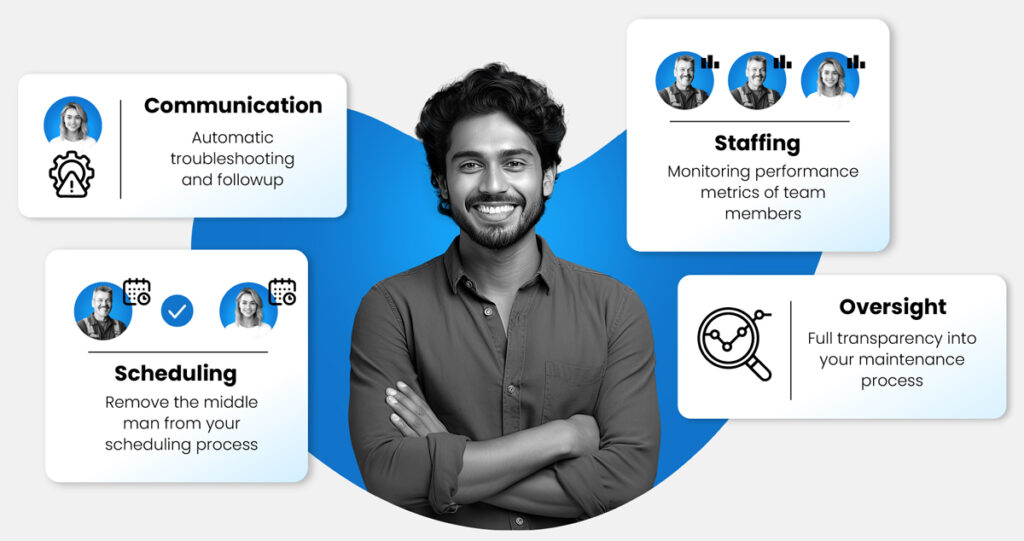A lot of people dream of owning a business, and for good reason. With solid staffing and efficient systems in place, a business can ultimately earn you money with little effort or stress. Done wrong, though, and the dream quickly becomes a nightmare. Much the same can be said of running a property management maintenance operation. Oftentimes, it boils down to a simple dichotomy: either you’re successfully running your company’s maintenance operation, or it’s running you. We’ve compiled some tips for how to ensure the dream doesn’t sour.
Set The Expectation For Your Maintenance Operation
If you want people to meet your expectations, you need to communicate what those expectations are. With employees and vendors, that means they know their role, responsibilities and what to do when issues inevitably arise. For example, maybe you expect your internal maintenance crew to ask for approval before they spend money on an equipment upgrade or repair. Or maybe you expect an external crew like your HVAC technicians to notify you if they foresee a job exceeding their estimated price. Neither expectation is unreasonable. But if it isn’t adequately communicated, it’s unlikely to be met.
Eyes On The Prize
It’s hard to gauge whether something is successful or not if you don’t first define what success looks like. With a maintenance operation, we believe the ultimate goal is resident satisfaction and consistent five-star reviews of your company. As we’ve noted in previous posts, good reviews lead to increased resident retention and decreases resident turnover. In other words, more revenue with less work.
The speed of repairing a maintenance issue is also a valuable goal, as quick fixes are directly correlated to higher resident satisfaction. As for your businesses’ bottom line, tracking the costs of maintenance repairs and working to slowly bring down expenses — e.g. through more favorable agreements with third-party technicians or — are also worth tracking and aspiring toward.
So how do you cut costs, speed up repairs and rack up positive reviews?

Dial-in Your Processes
Crafting efficient, simple and thorough processes for your staff means they’ll know how to handle almost any situation that arises. Ultimately, that translates to quicker decisions and less micro-managing and stress for you, the manager/owner.
Building a successful maintenance operation typically means creating a step-by-step process with clear, defined checkpoints and a system to verify each checkpoint as it’s reached. It also oftentimes means designing a system to prioritize maintenance issues, allowing a maintenance crew member to seamlessly redirect their attention from a leaky faucet fix to an HVAC failure repair.
Once you have a solid way to track and verify each maintenance issue is handled efficiently and with satisfaction, you can then create a system to track how each step of the process is performing, along with goals for each step. For example, maybe you have 200 open service issues and you hope to address 20 per week, or 10% every five days. With performance indicators, you can measure how quickly each job is addressed, track what types of jobs take the longest, and analyze where they usually get hung up. With those insights, you can then streamline your processes even further.
Good Hires Prevent Fires
A company is only as strong as its employees. In a maintenance program, that truth extends to the vendors you work with. As we noted before, you can sidestep a lot of issues by clearly communicating your expectations to vendors once they’re a part of your team. But before you can ever do that, you need to first find quality vendors, and at times painstakingly difficult proposition.
One piece of advice: remember that in this relationship, you’re the client. Your vendors should share the same goals as you and do what’s necessary to support your long-term vision. If a vendor isn’t on board with using the systems you have in place or the new Meld software you recently transitioned into, they’re demonstrating that they don’t share a commitment to your vision. That’s a big red flag.
Our data found 85 percent of maintenance jobs scheduled via Property Meld take less than four minutes, which led to an 87 percent increase in resident satisfaction and a 60 percent reduction in the time it takes to coordinate a maintenance job. When the ultimate goal is high resident satisfaction and positive company reviews and your processes get that done, if a vendor isn’t on board, they’re clearly not aligned with your company’s long-term goals. That means it’s time to move on.
Mind Over Matter
Technically, you’re managing properties. In reality, though, much of what you probably find yourself doing is managing people, be it residents, technicians or employees. Dealing with so many different people means there are innumerable factors beyond your control. That can be daunting or, depending on your perspective, liberating. Either way, it’s important to take a step back from your business at times. It’s not only good for your mental health, it can also allow you to observe your business from the 35,000-foot view, helping to identify your businesses’ macro trends, tendencies and challenges. In the end, the difference between running a business and having it run you can sometimes simply be a matter of perspective.
So…Are you running your maintenance operation like a business, or is the business running you?













